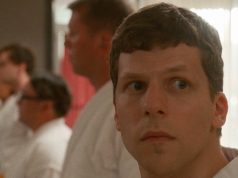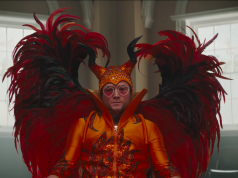We now add Jack Black to the list of actors who appear in films whose comedy relies primarily on whether you happen to think that actor is funny.
“School of Rock” also has the wonderful Joan Cusack, a likable crew of youngsters, and a fair helping of dialogue and situations that are funny regardless of the casting. But most of the laughs still come from Black’s delivery, that spastic juvenility, that post-ironic sloppy-silliness. He’s like a grown-up little kid, almost the way Chris Farley was, but more self-aware.
He performs with actual kids in “School of Rock,” playing an unemployed rock musician named Dewey who takes his roommate’s long-term substitute teaching gig to earn money. Having been kicked out of his own band (a pure ’80s-style long-haired heavy metal crew), Dewey now wants to assemble another group and win big cash in the upcoming battle of the bands. But you gotta pay the rent, bro, so he steals that teaching job.
It’s for a fifth-grade class at a snooty private academy, a real nerd factory, where as luck would have it the repressed kids are already accomplished musicians, though they are more familiar with Bach than with Bachman Turner Overdrive, better with Mozart than with Motown, more skilled with Beethoven than with the Beatles. (I could do this all day, folks.) Overhearing them one day, Dewey gets the idea that you have already foreseen: Turn the kids into a rock band, give everyone something to do (you need roadies and technicians, too, of course), and tell them it’s all for a special class project. The only trick will be to hide their daily rehearsals from the tamped-down, insecure principal (Cusack), and from the kids’ parents, who surely aren’t spending $18,000 a year for their children to learn power chords.
It is only slightly different from, say, “Mr. Holland’s Opus” in its basic structure. Dewey improves the kids’ morale, learns some valuable lessons himself, and all naysayers are converted during the concert that concludes the film. Indie director Richard Linklater (“Slacker,” “Dazed and Confused”) may lose some street cred with this rather genre-specific picture, but he will win points with the masses (something he has not accomplished before, at least not in terms of box office grosses).
And there is definitely still an alternative vibe to the film, a stick-it-to-The-Man attitude that Black exemplifies. His tour de force is a single-take scene in which he sings for the class a song he wrote and wants them to learn. It’s a pretentious progressive-rock anthem, something Rush would have written 25 years ago (or maybe would still write today; I haven’t really kept up with Rush), and as he sings it, he also gives instructions on how the lighting and fog effects would be used, where the drums kick in, and so on. He doesn’t just write a song, he writes a whole rock show. Is Black mocking this self-important, out-dated style of rock ‘n’ roll, or is he endorsing it? Taken either way, it is both hilarious and energizing.
I’m impressed with the lack of cynicism at play here. Dewey wants to teach the kids to be rock stars, but only in the pure way that Dewey imagines is the heart of rock ‘n’ roll, without the drugs and money and associated ill effects. When one of the kids gets too caught up in it all and hangs out with a grown-up band that sits in a van and drinks beer, Dewey whisks him out of there like an angry father. He talks elsewhere about how being a rock god will get you “the ladies,” but it hardly seems like he’s taking about sex. For Dewey, it’s all about the music. Getting “the ladies” would just mean having more adoring fans to watch you play.
And so even though he’s using the kids to win a band competition, and even though it is mildly disquieting in this day and age to hear a teacher tell his students to keep something a secret from their parents, there is still an overriding sense of innocence about it all. Dewey’s using the kids, but he LIKES them, too. They’re nice kids, with personalities and flaws and character.
Dewey’s devotion to rockin’, and to the youth-culture tenets of playin’ it loud and rockin’ all night, is ceaselessly entertaining. Whether you take it as an homage or a parody — that is, whether you take rock ‘n’ roll seriously or not — it’s either way a truly joyful, funny movie.
B+ (1 hr., 49 min.; )





